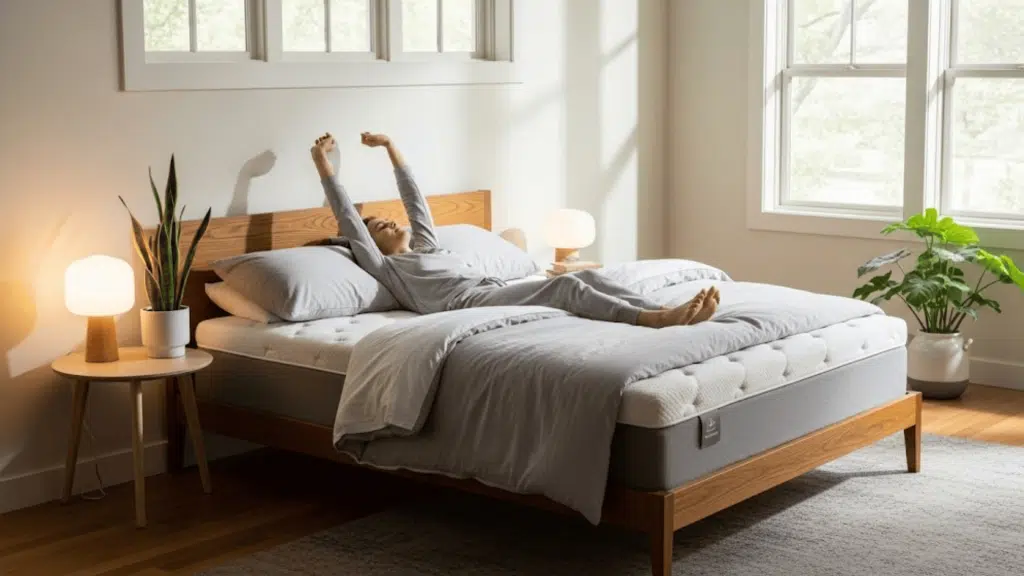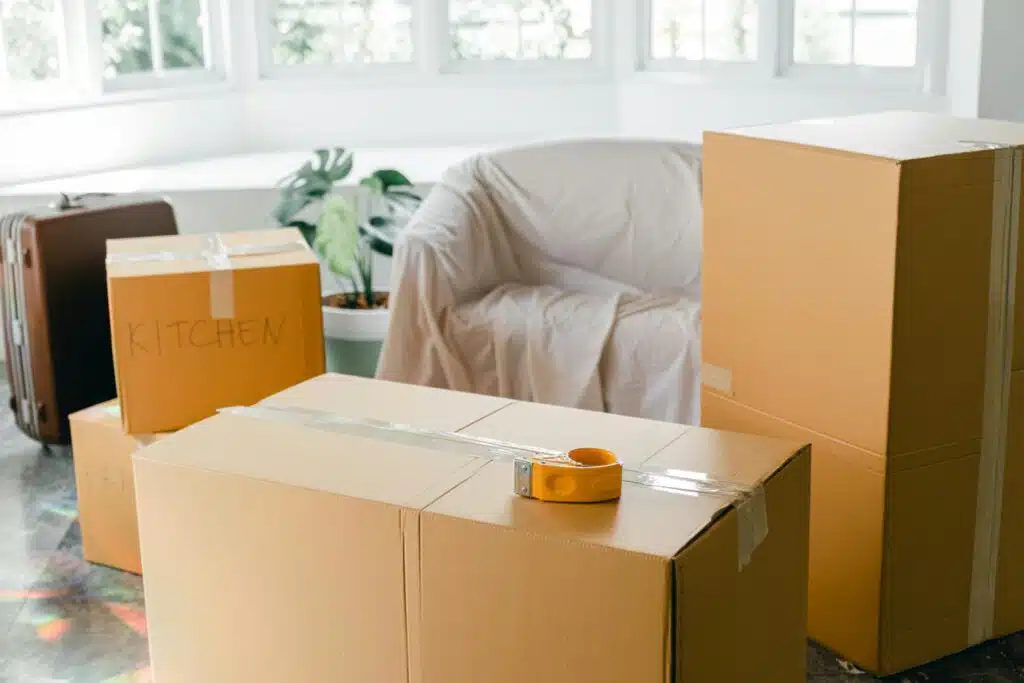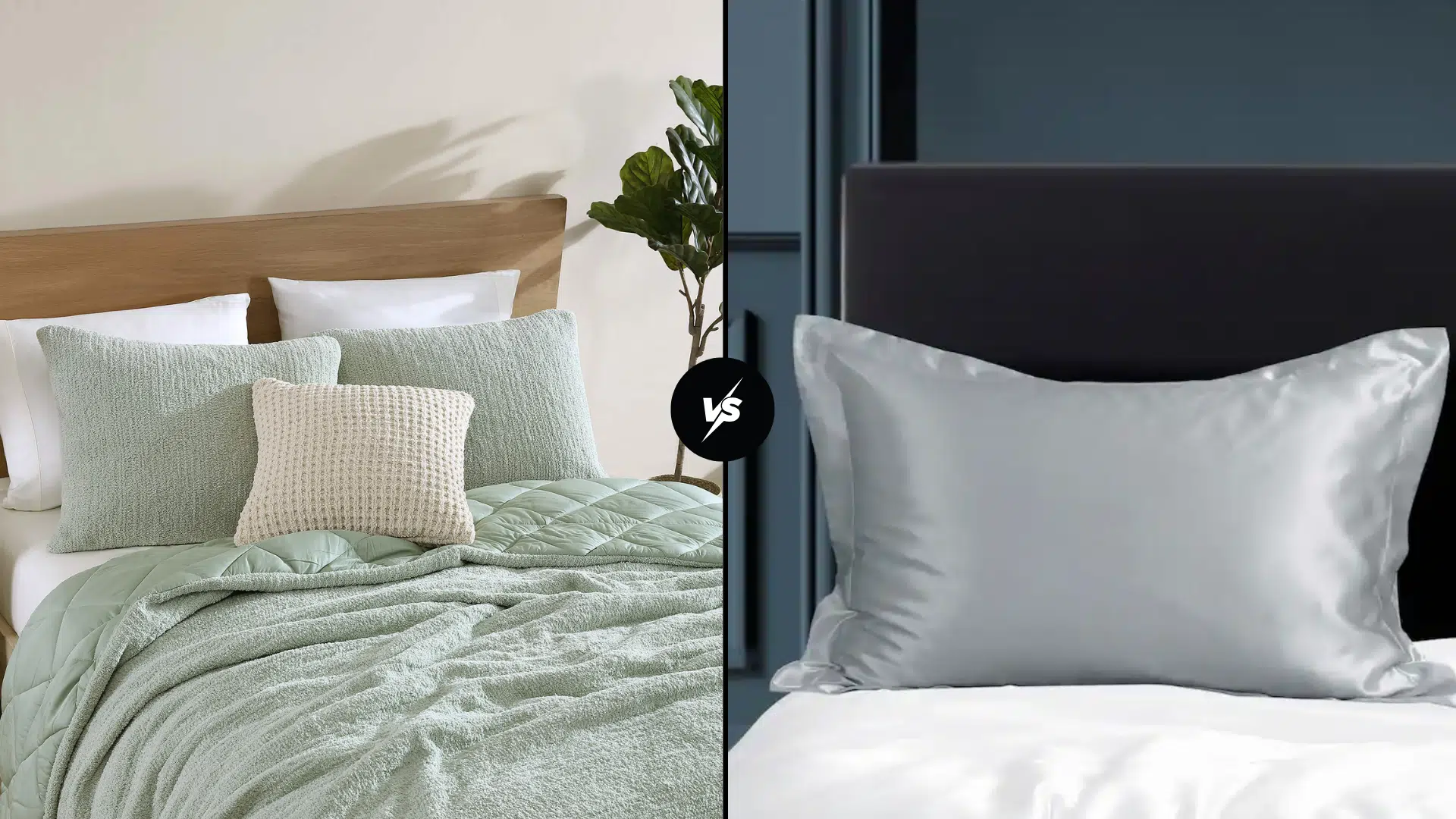Waking up with a sore back can throw off your whole day. I’ve been there, you climb into bed feeling comfortable, only to wake up stiff and achy.
If you’ve been wondering why your mattress feels great at first but leaves you hurting in the morning, you’re not the only one out there. For some people, memory foam can be a dream; for others, it can lead to memory foam mattress back pain that’s hard to ignore.
I’ll walk you through how this happens, the role mattress firmness plays, and how different sleeping positions affect your spine. You’ll also learn how to match your mattress to your body and any back issues, so you can finally rest without regret.
Let’s find out if your mattress is helping or hurting your back.
How Memory Foam Mattress Causes Back Pain
Memory foam is like Play-Doh for grown-ups; it squishes around your body and remembers your shape. When you lie down, it hugs your curves so your back stays straight instead of getting twisted up.
If you sleep on your side and your back always hurts, memory foam can be amazing because it doesn’t push against your shoulders and hips like regular mattresses do. But here’s the thing: Memory foam isn’t magic.
Cheap ones get saggy and leave you sleeping in a dent that messes up your spine. Plus, some trap heat like crazy, making you sweat all night.
And if you sleep on your stomach with super-soft memory foam, your belly sinks too deeply and makes your back arch painfully.
How Mattress Firmness Affects Back Pain
Think of your mattress like a seesaw for your back. Too soft, and you sink into weird spots. Too firm, and you get pushed around.
The right firmness keeps your back straight by spreading out your weight instead of creating sore spots.
Soft Mattress and Back Pain
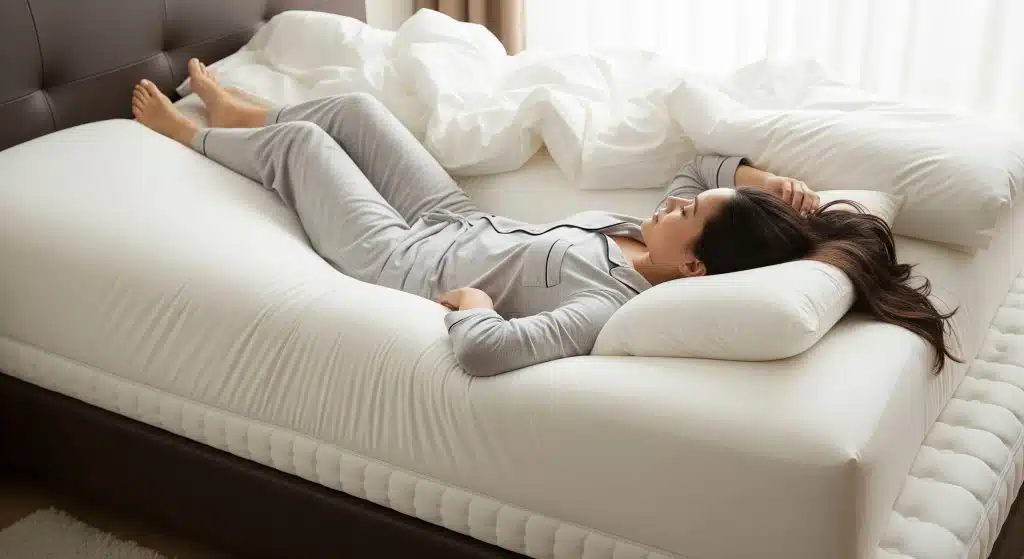
Really soft mattresses feel like sleeping on a marshmallow, but they can mess up your back big time. When your butt and shoulders sink way down, your spine bends like a noodle instead of staying straight.
It’s like trying to sleep in a hammock where everything droops toward the middle. Your lower back has to work overtime holding you up, so you wake up all stiff and cranky.
But if you’re skinny and sleep on your side, a softer bed might actually feel great because you won’t sink as much.
Firm Mattress and Back Pain
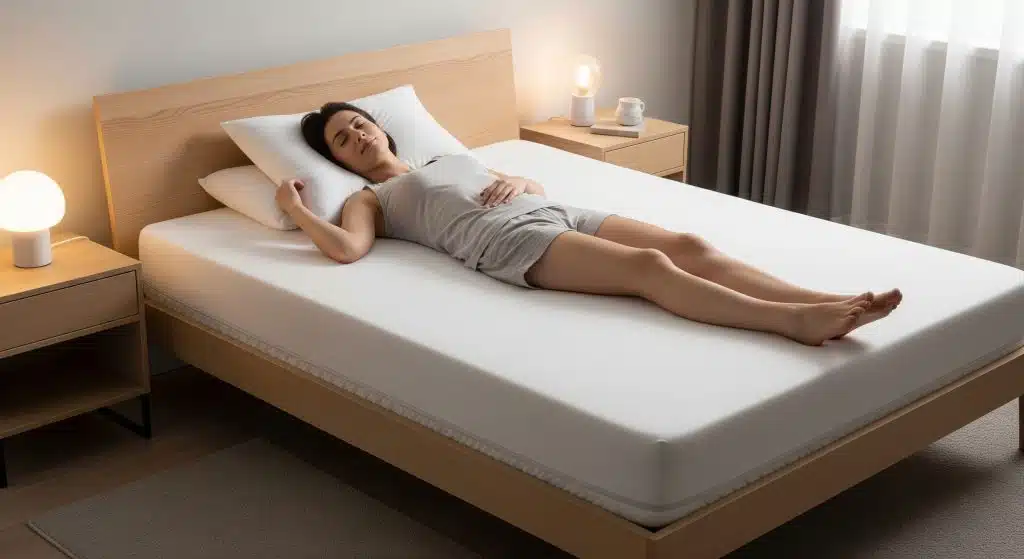
Super firm mattresses can be just as awful, but for different reasons. They’re like sleeping on concrete; they don’t give at all.
Your shoulders and hips get shoved up while your lower back hangs in the air with no support.
But if you’re bigger or sleep on your stomach, a firm mattress might be perfect because it keeps everything flat and stops that painful back bend.
Specific Back Conditions & Mattress Choice
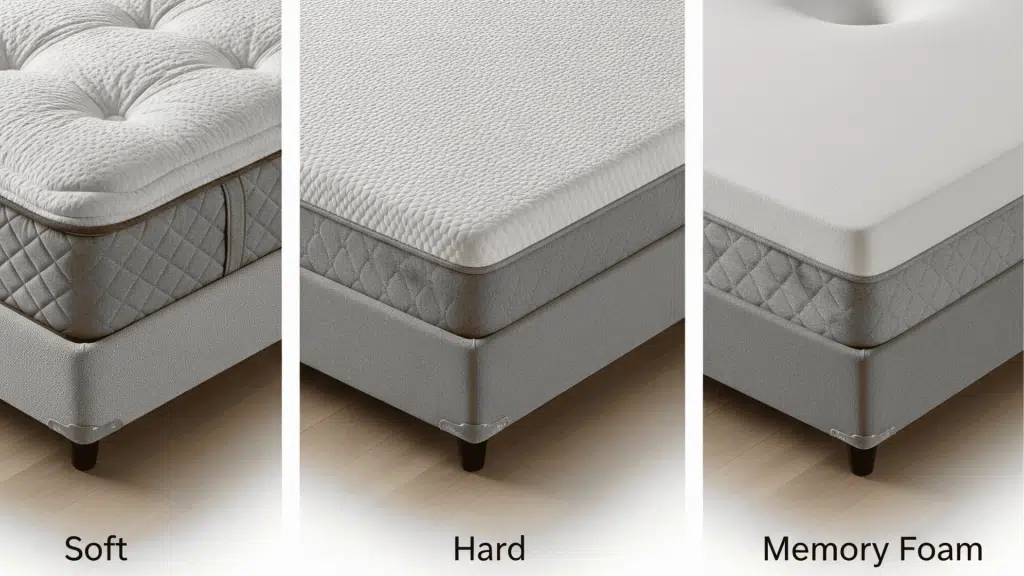
Your back problem isn’t just back pain; it’s your specific back problem, and that changes everything about what mattress will help you sleep better. Here are some common issues people face:
1. Lower Back Pain

If your lower back feels like someone’s stabbing it every morning, my mattress might be the bad guy. You need something that fills in that gap under your lower back when you lie down.
Medium-firm mattresses usually work best because they hold up the spine without feeling like concrete. Memory foam is great because it hugs the curved part of the back, so it doesn’t just hang there all night.
2. Sciatica

When that crazy shooting pain runs down the leg, I know the sciatic nerve is mad. A mattress that’s too squishy lets the hips drop down, which squeezes that nerve even more.
Then one needs medium firm support that keeps the hips level and stops putting pressure on the lower spine. Memory foam helps because it shapes around the body without letting it sink like quicksand.
3. Scoliosis

The curved spine makes buying a mattress super hard because the back isn’t shaped like everyone else’s. Then you need a mattress that can bend with your weird curves instead of fighting them.
Memory foam works well because it molds to the shape of the body. Too hard, and it pushes against the ribs in uncomfortable ways. Too soft, and then the spine gets even more twisted up.
4. Spinal Stenosis

With the squeezed spinal canal, lying in certain ways makes everything hurt worse. One usually feels better when curled up a bit, so a softer mattress that lets the body sink a little might actually help.
Sleeping flat on a hard mattress often makes things worse because it straightens the spine too much.
One needs something that holds it up while letting the body find that sweet spot where the nerves aren’t getting pinched.
The bottom line? Your specific back issue needs its own mattress solution; there’s no one-size-fits-all answer.
Matching Mattress Firmness to Sleeping Position
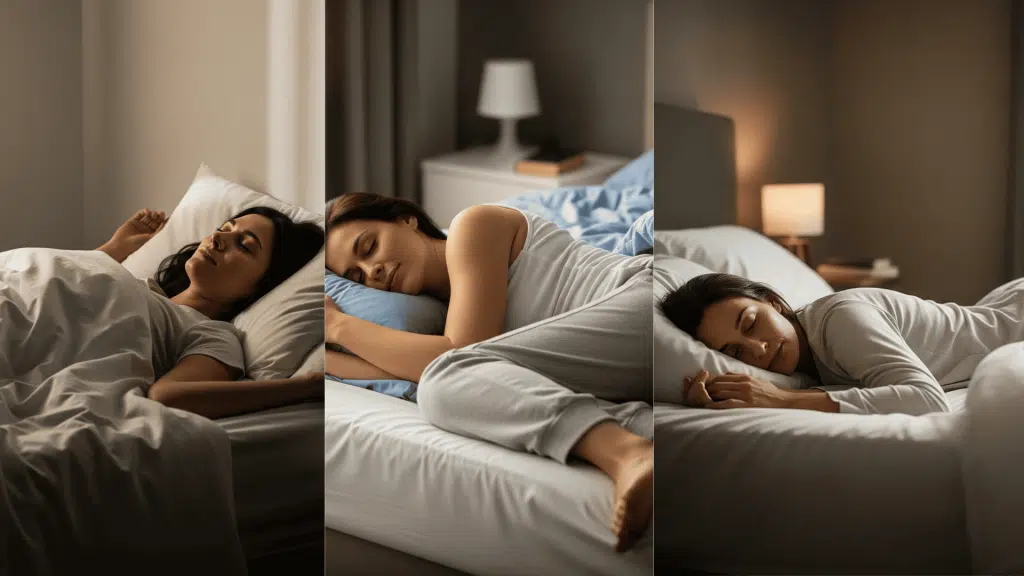
The way we sleep totally changes what mattress will help or hurt; it’s like picking different shoes for different sports.
- Back Sleepers: If you sleep on your back, you need medium-firm support. Too soft, will make the butt sink while the shoulders will stay up. Too firm, and there’s a gap under the lower back.
- Side Sleepers: When you sleep on your side, the shoulders and hips stick out and need somewhere to go. Softer to medium mattresses let these parts sink just enough to keep the spine straight.
- Stomach Sleepers: Sleeping on your stomach is hard on the back. You need a firm mattress that keeps the belly from sinking down and making the back arch backwards all night.
Your sleeping style tells you exactly what firmness your body needs.
How to Choose the Right Mattress for Your Back
Picking the right mattress isn’t about the fanciest one or what your neighbor loves; it’s about what works for your back.
Think about three things: weight, how you sleep, and where it hurts. Heavy people need firmer beds so they don’t sink. Light people can go softer. Side sleepers need different stuff than back or stomach sleepers.
Don’t just buy online! You need to lie on it in the store for at least 10 minutes, even if it feels weird. If you can’t test it, you’d better get at least 90 nights to try it at home.
Always check the return rules first. Some companies make returning mattresses a huge pain. You would want to know exactly what you are getting into.
The best mattress lets you wake up without saying, “ugh, my back hurts.”
Conclusion
I’ve learned that waking up sore often comes down to mattress firmness, sleeping position, and your unique back needs. Now you know how each of these factors can play a big role and how the wrong setup can lead to memory foam mattress back pain.
Think about your body type, preferred sleep position, and any back issues before choosing or adjusting a mattress. Even small tweaks, like changing firmness or how you sleep, can make a big difference in comfort.
Don’t settle for mornings filled with aches. Make your bed work for you.
For more tips on better sleep and back health, check out my other blogs and start creating nights that leave you ready for the day ahead!


